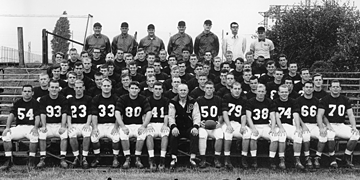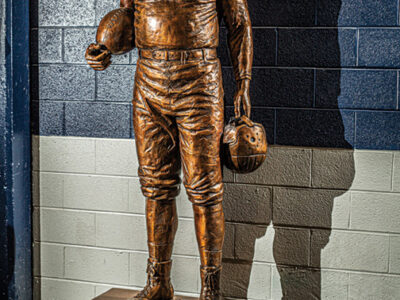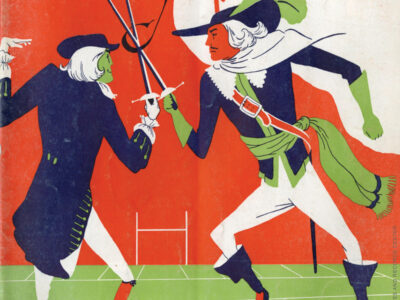Two views of Quaker football, from the bottom and the top of the Ivy League.

The Compensations of Defeat
By Dan Rottenberg
Outlined against a bleak April sky, a car speeds west through Pennsylvania Dutch country. Its occupants—Jon Stiklorius C’63 and this writer—barely know each other, but on this Saturday morning some mysterious force pulls us from Philadelphia. The same force draws other cars bearing some two dozen other men from Washington, Baltimore, south Jersey, New York, Connecticut, all converging on the Lancaster Host Resort outside Lancaster, Pennsylvania. The passengers are 60-ish doctors, executives, money managers, writers, even a TV actor. All share one seemingly dubious characteristic: We played football during the worst period in the sport’s long and illustrious history at Penn—the tenure of coach John Stiegman from 1960 to 1964.
Stiegman’s record over those five seasons—12 victories, 33 defeats—remains the poorest ever by a Penn coach. His best teams never won more than three games and never finished higher than sixth in the Ivy League. And Stiegman’s gruff Prussian bearing seemed incapable of inspiring his troops or Penn’s fans.
Yet before coming to Penn, Stiegman had known only one losing season as a player and coach. As an undergraduate in 1942, he had played on the only Williams College team ever to defeat Princeton. As an assistant coach at Princeton in the late ’40s and early ’50s, he had provided much of the tactical brainpower behind Charlie Caldwell’s nationally ranked teams. In the late ’50s, one of Stiegman’s Rutgers teams had gone undefeated.
These facts seem to point to an inescapable conclusion: Stiegman wasn’t a loser—we were.
Nevertheless, this past spring—nearly 40 years after Penn fired him, and years after he retired to upstate New York—Stiegman contacted Fred Jaffin C’64,captain of Penn’s 1963 team. He was coming down to Lancaster for a Rotary convention, Stiegman explained, and he wanted to see his old Penn players one more time. If Fred could round us up, the coach would like to buy us lunch.
Jaffin complied, but the night before the reunion he phoned me apprehensively. Between us we calculated that Stiegman must be 80 by now, or close to it. Was he dying? Was he senile? There was a certain logic to this anxiety. Why, in the evening of his life, did Stiegman want to see us, of all people—the losers who destroyed his reputation—rather than the winners who paved his career path?
The answer awaits us in Lancaster. Like the doomed crew of the Pequod in Moby Dick, our Captain Ahab has beckoned to us one last time, and we feel powerless to resist. But as we approach, bitter memories long buried bubble back to the surface.
Franklin Field, November 28, 1963. A Penn pass falls incomplete on the final play of my class’s senior season. But the game is already out of reach: We have lost to Cornell, 17-8, and have finished with three victories and six defeats. In a stadium that once routinely seated 78,000 spectators for Penn’s traditional Thanksgiving rivalry, we have attracted just 8,800, many of whom have already gone home.
This wasn’t the way our football careers were supposed to end. In my adolescent fantasies, we would roar through our senior season with a perfect record and return to campus forever afterward as revered heroes. Now, I realize with dismay, we’ve blown our only shot at immortality.
Yet a funny thing happened over the ensuing years. Stiegman’s Penn players and coaches did not fade into obscurity. Instead of producing pro football players, we produced high-powered lawyers, doctors, and professors. Bill Novelli C’63 ASC’64 became executive director of AARP. Jim Riepe W’65 WG’67 became chairman and director of the T. Rowe Price Fund, not to mention chairman of Penn’s board of trustees. John Doman C’66 became an actor in films as well as TV shows like “Law and Order,” “The Practice,” and “NYPD Blue.”
Largely through Fred Jaffin’s efforts, many of us kept in touch and remained active, recruiting and supporting Penn’s Ivy championship teams of the 1980s and 1990s. A frequent presence at our reunions has been Frank Dolson W’54, the retired Philadelphia Inquirer sports editor, who insists to our astonishment that we were his favorite of all the teams he covered in his 41-year career. The greatest sports contest he ever witnessed, he claims, was neither the World Series nor Oklahoma vs. Nebraska, but Penn’s stunning 7-2 upset in 1963 over an undefeated Harvard team that had been celebrated on the cover of Sports Illustrated just two days earlier.
On this rare day when Stiegman’s game plan (take the wind, don’t pass, employ relentless punting and downfield punt coverage to pin Harvard’s offense against its own goal line while harrying the Crimson into committing fumbles and interceptions) actually worked as he intended, a hapless group of Penn playerswith an 0-3 Ivy League record rose to an occasion, played like All-Americans, and shocked a Harvard team that boasted the longest unbeaten streak in the nation. It was also the only Ivy League game Stiegman won during his final two years at Penn.
So the question remained: Did Stiegman and Dolson know something about us that we didn’t know ourselves?
At the Host Resort, our apprehensions dissolve as our once-austere coach greets us with grins, warm handshakes, and even a few hugs. Stiegman is thinner than we recall him but otherwise quite fit, notwithstanding a bout with prostate cancer, the death of his first wife, and a divorce from his second.
In his customarily methodical manner, Stiegman distributes a packet to each of us; it includes photos of his five Penn teams, a magazine article by Bill Novelli about “reinventing retirement,” and the Gazette’sannouncement of Jim Riepe’s election to the chairmanship of Penn’s trustees—suggestions that Stiegman has followed our careers from a distance. Also included is Stiegman’s page from his Williams 50th reunion yearbook; it contains one clue to his purpose in bringing us here: “Although some might say that I have mellowed, I hope that means more genial and warmer to others.”
Amid the banter that follows, Jaffin presents Stiegman with a football we’ve autographed. Stiegman presents Novelli with a Penn jersey from the 1960s emblazoned with the number 90 that Novelli wore as a wingback.There is much laughter about Stiegman’s complex strategies that his players never quite grasped. (“If he’d asked us to do nuclear physics,” jokes tailback John Owens C’64, now a cardiologist, “we could have handled it.”) But there is no talk of regrets. New York investment banker Fred Levin W’64, who intercepted eight passes in his Penn career, remarks that whenever his son agonizes over a sports defeat, “I tell him you learn much more from losing than from winning.”
Soon we find ourselves remembering not Stiegman’s flaws but his virtues: His integrity (Frank Dolson recalls Stiegman’s refusal to let Dolson’s published criticisms of his coaching interfere with their friendship). His work ethic (Harry Gamble—later Penn head coach and president of the Philadelphia Eagles, who started his college coaching career as a Stiegman assistant—reminisces about watching game films with Stiegman until dawn one Saturday night, after which Stiegman proceeded to his office without any sleep to chart his strategy for the next week’s game). His attention to detail (he still seems to remember every play of every game, and every player). His refusal to make excuses in defeat (although Penn’s sports-hostile admissions department deserved much of the blame for his poor record). And above all, something most of us had never noticed before: his basic orientation as a teacher.
“You know, I hated to lose,” Stiegman tells us in his peroration. “But at least I was getting paid. But you guys—you had nothing to gain, yet you kept coming out to play, even when you were losing. That’s what’s really interesting—much more than the guys who were winning.”
So that was what Stiegman (and Dolson, too) admired in us: the character of losers who refuse to quit in the face of overwhelming adversity.
“It’s time to burn the book on the Stiegman era,” I wrote in 1973, when I was all of 31. Now, at 60, I realize I was wrong. Our playing days are over; our education continues.
Dan Rottenberg C’64, is editor of Family Businessmagazine and author of eight books, including Fight On, Pennsylvania: A Century of Red and Blue Footballand, most recently, The Man Who Made Wall Street: Anthony J. Drexel and the Rise of Modern Finance[“Off the Shelf,” September/October].

Miracle on 33rd Street
By David Porter
It was a game to end all games, in a season to end all seasons. Penn’s 23-21 football victory over Harvard 20 years ago was that rare event that exceeded its own promise of greatness, and it had the further effect of helping to transform the climate of losing that had dogged the program for most of the previous two decades. Dubbed the Miracle on 33rd Street at the time, in retrospect the dizzying ride the Quakers took to the top of the Ivy League that magical autumn could not have had a more logical climax than what occurred at Franklin Field on November 13, 1982.
To fully appreciate what confronted the Quakers on that bright, windy afternoon is to consider the huge void a perennially losing football team can create in a university’s athletic profile. From 1960 through 1981, only five of 22 Penn teams won more games than they lost. With two wins and 27 losses from 1979-1981, the words “Penn football” had become, to put it mildly, a source of embarrassment on campus. When Penthouse magazine’s college-football issue named the Quakers one of the worst teams in the country prior to the 1982 season, students, in their customary ironic fashion, took it as a sign that at least the team was being recognized for something. The players were not amused. But they also knew something the student body did not. A perceptible change had begun to take hold the season before, spurred by the arrival of head coach Jerry Berndt from DePauw University and by a crop of talented underclassmen determined to reverse the pattern of failures.
“You could see the improvement,” quarterback Gary Vura W’83 recalls. “You could sense that the corner was being turned. We got into camp and everybody was ready. And I think the team was pretty sick and tired of losing all the time.” Kicker Dave Shulman W’84 remembers “a group of people that had a lot of heart, and a new coach that was willing to turn the program around and give it a facelift.”
The first hint came in a stunning, opening-game shutout of defending champ Dartmouth in Hanover, the Quakers’ first Ivy road win in six seasons. A 20-17 win over Lehigh followed, and avenged a 58-0 loss from a year earlier. As the wins piled up, Philadelphia’s sports media, starved for stories during a two-month NFL strike, began to take notice. By the middle of November, the Quakers were one win away from a tie for their first Ivy title since 1959, a notion that would have been dismissed as preposterous eight weeks earlier. Standing in their way was Harvard, which had defeated Penn nine straight times and had not lost at Franklin Field since 1963 (see previous article).
To the surprise of even the staunchest Penn supporters, the Quakers dominated the Crimson for three quarters, “kicked their tails, almost,” according to Berndt. From there, though, things fell apart quickly for the home side. Three straight scores by Harvard, the last with 1:24 remaining, put the Quakers behind 21-20 and shocked most of the crowd of 34,746 into silence. Yet the next 84 seconds encapsulated a season in which almost everything seemed to bounce the Quakers’ way.
On their own 15-yard line after two plays netted a loss of five yards, Vura found wide receiver Rich Syrek W’84 for a first down at the Penn 33 but was flattened by a Harvard defender and forced to leave the game. A friend would later tell Vura that he saw Harvard’s assistant coaches exchanging high-fives in the press box. Vura returned one play later, however, groggy but determined to finish the game. On the next play, aiming for Warren Buehler C’85 near midfield, he fired a pass that hit Buehler’s hands just as a defender ran into the wide receiver. The ball popped into the air, and, as if equipped with a homing device, landed in Syrek’s hands at the Harvard 48 as the crowd let out a collective gasp. There were now 17 seconds left, and the Quakers were still 20 yards out of field goal range. Vura took care of that with sideline passes to Buehler and running back Steve Flacco W’83. Now Shulman, who had watched most of the final drive alone at the far end of the Penn sideline, would kick from 38 yards to decide the game.
The next sequence still raises hackles in Cambridge. Shulman’s kick into the teeth of the wind missed badly to the left, but as Harvard’s players and fans celebrated, an official’s flag fluttered to the ground near the spot where the kick had been taken. One of the Harvard players had committed a roughing penalty by barreling into Shulman after the kick. Though no time was left on the clock, the kick would be re-taken.
“At the time I thought there was no way this thing could be over,” Shulman says. “I knew I’d gotten hit.”
As Harvard coach Joe Restic screamed at the officials through the din, the ball was moved to the 10-yard line, making it a 27-yard attempt. This time Shulman’s kick split the uprights, and a huge roar shook the stadium, as if years of pent-up frustration were finally being released. Students swarmed the field from the south stands, one mob heading straight for the goalpost at the west end, which they would eventually topple and toss into the Schuylkill River. Others hugged, cried, or milled about with no apparent purpose, unfamiliar with the etiquette of championship celebrations. Berndt describes going from “the depths of the ocean to the top of Mount Everest” in the final, crazy seconds.
At the bottom of a pile of players, Vura found himself facemask to facemask with Shulman. Four years earlier as a high-school senior, he had stood on the red-and-blue ‘P’ on the 50-yard line with then-coach Harry Gamble and dreamed of someday playing in front of a huge crowd in the ancient wood-and-brick stadium. For three years that prospect seemed as remote as a windless day in Superblock. Now, his dream realized, Vura could think only of one thing.
“I can’t breathe,” he remembers saying to Shulman, adding today with a laugh, “I was thinking, ‘We just won the Ivy League title and I’m going to die.’”
Vura, who works for a British brokerage firm that escaped with only one casualty from the North Tower of the World Trade Center on September 11, 2001, and Shulman, who lives in Greenwich, Connecticut, and works for UBS Warburg, both say the Harvard game frequently comes up in random conversations now, 20 years later. It no doubt will be a central topic at the 1982 team’s reunion at the Penn-Harvard game on November 16, the 20th anniversary of a game and a season that went from impossible to improbable to incredible.
“A lot of people call it a miracle season,” Berndt says. “But I’m not sure the players and coaches felt that way. I think most of us felt we were capable of winning.”
David Porter C’82 is the author of Fixed: How Goodfellas Bought Boston College Basketball and the Gazette’s sports columnist.




